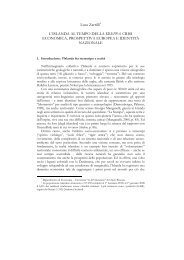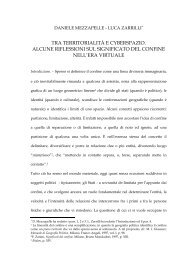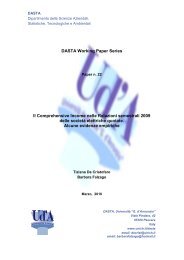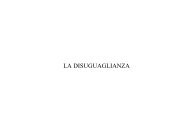DASTA Working Paper Series Life Cycle Assessment in the tourism ...
DASTA Working Paper Series Life Cycle Assessment in the tourism ...
DASTA Working Paper Series Life Cycle Assessment in the tourism ...
Create successful ePaper yourself
Turn your PDF publications into a flip-book with our unique Google optimized e-Paper software.
<strong>DASTA</strong> – <strong>Work<strong>in</strong>g</strong> <strong>Paper</strong><br />
adequately taken <strong>in</strong>to account. The impact categories are too generic and not<br />
thorough (e.g., air pollution could <strong>in</strong>clude global warm<strong>in</strong>g, ozone layer<br />
depletion, acidification, w<strong>in</strong>ter and summer smog, etc.). Although <strong>the</strong><br />
characterization phase was not implemented, <strong>the</strong> authors compare <strong>the</strong><br />
products not only <strong>in</strong> terms of environmental burden, but also environmental<br />
impact.<br />
3.7 LCA of accommodation services <strong>in</strong> three Italian hotels (Raggi et al.,<br />
2005; De Camillis et al., 2008)<br />
In this paragraph three case studies will be presented. Their analysis has<br />
been consolidated as <strong>the</strong>ir characteristics are quite similar.<br />
Methodology Conventional LCA accord<strong>in</strong>g to <strong>the</strong> relevant ISO standards.<br />
Products Accommodation services <strong>in</strong>: hotel Prestige <strong>in</strong> Montesilvano,<br />
Abruzzo (Tontodonati, 2002; Petti and Tontodonati, 2002), hotel Dante <strong>in</strong><br />
Cervia, Emilia Romagna (Mazzoni, 2004; Mazzoni et al., 2004), hotel Duca<br />
d‟Aosta <strong>in</strong> Pescara, Abruzzo (De Camillis et al., 2008).<br />
Objectives The objectives of <strong>the</strong> LCA studies are as follows: identification<br />
of <strong>the</strong> environmental hot spots of accommodation services; support to <strong>the</strong><br />
implementation of environmental management systems; <strong>in</strong>crease experience<br />
to def<strong>in</strong>e <strong>the</strong> Product Category Rules (PCRs) for Type-III environmental<br />
labell<strong>in</strong>g.<br />
Functional unit Accommodation service referred to a one-night stay.<br />
System boundaries All hotel activities were considered <strong>in</strong> <strong>the</strong> system<br />
boundaries. As regards <strong>the</strong> ma<strong>in</strong> service of hospitality, <strong>the</strong> follow<strong>in</strong>g process<br />
units were considered: clean<strong>in</strong>g (rooms, halls, bathrooms, restaurant, bedd<strong>in</strong>g,<br />
towels, etc.), transport<strong>in</strong>g of bedd<strong>in</strong>g and towels (if not washed <strong>in</strong>ternally),<br />
heat and power production and use, waste release and management,<br />
production and transport of materials and products used (complimentary<br />
objects, toilet paper, detergents, etc.). In addition, guest transport to and from<br />
<strong>the</strong> hotel was <strong>in</strong>cluded. The production of durable goods – capital goods<br />
employed by <strong>the</strong> hotel – and <strong>the</strong> construction of <strong>the</strong> build<strong>in</strong>g with <strong>the</strong><br />
processes l<strong>in</strong>ked to <strong>the</strong>m were not <strong>in</strong>cluded <strong>in</strong> <strong>the</strong> system boundaries.<br />
Data quality The <strong>in</strong>ventory data were ga<strong>the</strong>red directly <strong>in</strong> <strong>the</strong> hotels and <strong>the</strong><br />
facilities of some suppliers (e.g., laundries, pr<strong>in</strong>ter's, etc.) through site visits,<br />
direct <strong>in</strong>terviews with management and staff, direct contact with suppliers.<br />
Environmental impact assessment method The data ga<strong>the</strong>red were<br />
processed us<strong>in</strong>g GaBi 4 software. The environmental issues were assessed<br />
accord<strong>in</strong>g to <strong>the</strong> CML96 and CML2001 methods.<br />
Special features The authors implemented “modular” LCAs <strong>in</strong> which each<br />
service (module) supplied by <strong>the</strong> hotel was assessed <strong>in</strong>dividually. Thus, <strong>the</strong><br />
environmental impacts with<strong>in</strong> <strong>the</strong> product system can be calculated totall<strong>in</strong>g<br />
De Camillis, Raggi, Petti 10






